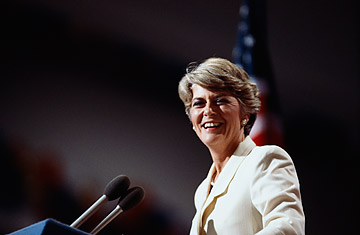
Geraldine Ferraro
(2 of 2)
All that, unfortunately, overshadowed Ferraro's strength as a candidate — ably filling the veep role of going on the attack while allowing the guy at the top of the ticket to appear above the fray. Journalists and politicians could not get over the novelty of a woman running to be a heartbeat away from the presidency — and there was not a small amount of condescension. In fact, during her debate with Bush, Ferraro turned to her opponent and said, "Let me just say first of all, that I almost resent, Vice President Bush, your patronizing attitude that you have to teach me about foreign policy." But he was not the only one. She was asked at one point if, she assumed the top job, that the Soviets might take advantage of the fact that she was a woman. Her responses were dignified but not without strong hints of a fiery disdain for the tone of the inquisition.
Ferraro's post-1984 existence began with promise. There was a big book deal and she still had ambitions about the Senate. She would make two stabs at it. But the detritus of her national campaign could not be washed away. (In fact, her husband would continue to have legal problems over it — problems she believed would never have arisen had she not run for Vice-President.) She would lose the Democratic primary in 1992 in a nasty three-way battle, with all the old controversy over taxes and her husband stirred up in the messy style of New York politics. She lost the primary by a percentage point and refused to concede for weeks. The seat was eventually won by Republican Alphonse D'Amato. In 1998, she ran again, and though she was the favorite in the beginning — as she had been in 1992 — she was outspent by Chuck Schumer who eventually went on to the Senate.
The rest of her life was varied and versatile. She was a television commentator on both CNN and Fox; and she served important stints as a U.S. appointee to the United Nations. But, even as she dealt with a chronic and incurable cancer, she seemed to know that she was filling the role of icon — and she played that role impressively, if not always tactfully. When Hillary Clinton was running for the Democratic Presidential nomination in 2008, Ferraro was one of her biggest champions — so much so that she started a controversy by questioning Barack Obama's qualifications to be President, saying he would not be there if he was white, just as she would not have been Mondale's veep had she been "Gerald Ferraro." She welcomed Palin's entry into the the contest though she warned again that any bounce in the polls would be shortlived.
In 1987, she reflected on the personal cost of being a historic figure, telling the New York Times : "More than once I have sat down and said to myself, oh, God, I wish I had never gone through with it," but then added, "I think the candidacy opened a door for women in national politics, and I don't regret that for one minute. I'm proud of that." And toward the end of her life, she was certain of her contribution, despite the defeats and despite the disappointment. She told Newsweek in 2008, "Every time a woman runs, women win." By being first, Geraldine Ferraro braved hazards no one had even thought of. Her mistakes and her trials have become lessons not just for women but for all American politicians. She won by losing.
